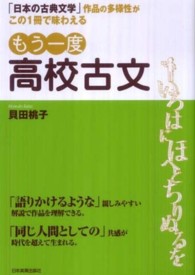Full Description
Victor Zhivov's Language and Culture in Eighteenth-Century Russia is one of the most important studies ever published on eighteenth-century Russia. Historians and students of Russian culture agree that the creation of a Russian literary language was key to the formation of a modern secular culture, and this title traces the growth of a vernacular language from the ""hybrid Slavonic"" of the late seventeenth century through the debates between ""archaists and innovators"" of the early nineteenth century. Zhivov's study is an essential work on the genesis of modern Russian culture; the aim of this translation is to make it available to historians and students of the field.
Contents
Translator's Introduction
Preface to the English Edition
Introduction
Problems in the Prehistory of the New Type of Russian Literary Language
1 The Literary Language of the New Type as an Object of Social and Cultural History
2 The Functional Reconceptualization of Genetically Heterogeneous Elements in the History of Russian Writing
3 The Main Registers of the Bookish Language and the Processes of Their Formation
4 The Reconceptualization of the Varieties of the Bookish Language
5 Linguistic "Simplicity" and the Means of its Realization
6 The Secularization of Culture, Its Specifics in Russia, and Its Significance for Rethinking Linguistic Usage
Chapter 1 The Petrine Language Reform; The Linguistic and Cultural Situation of the Petrine Era
1 Tasks of the Language Reform and the Nature of its Realization
1.1 The Reform of the Alphabet as the Prototype of Language Reform
1.2 Petrine Linguistic Directives
1.3 From Hybrid Church Slavonic to the "Simple" Russian Language
1.4 Innovation and Continuity in the New Literary Language
2 Language Policy and the Conflict of Cultures
2.1 Language Reform and Political-Ecclesiastical Conflicts
2.2 "Simplicity" and the Semiotic Functions of Civil Speech
Chapter 2 The Start of Normalization of the New Literary Language; The Formulation of Linguistic Theories and Literary Practice
1 The Formation of Petersburg Culture and the New Conception of the Literary Language
1.1 The Linguistic Program of the First Codifiers: New Issues
1.2 Classicist Purism and Its Initial Reception
1.3 The Actualization of Genetic Parameters: Slavonicisms
1.4 Normalization in Morphology and the Use of Genetic Parameters
xvii 2 The Conflict Between Linguistic Theory and Actual Practice; The Concept of a Poetic Language
2.1 Poetic License and the Church Slavonic Literary and Linguistic Tradition
2.2 The Language of the Ode and Church Slavonic Panegyric Poetry
Chapter 3 The Changed Conception of the Literary Language; The ""Slavenorossiiskii Language" and the Synthesis of Cultural and Linguistic Traditions
1 The New Nature of the Russian Literary Language and the Emergence of Slavonicizing Purism
1.1 The Polyfunctionism of the New Literary Language
1.2 The Single Nature of Russian and Church Slavonic
1.3 The New Interpretation of Purist Categories
2 Rationalist Purism and the Richness of the Slavenorossiiskii Language
2.1 The Richness and "Antiquity" of Russian
2.2 The New Stylistic Normalization
2.3 Rationalist Purism and Its Russian Metamorphosis
3 The Synthesis of Cultural and Linguistic Traditions: The Slavenorossiiskii Language and Its Functioning
3.1 The Evolution of the Language of Religious Literature
3.2 The Unified Language of a Unified Culture
Chapter 4 The New Cultural Differentiation; Linguistic Purity as an Ideological Category
1 The Emancipation of Culture and the Polemic Between Archaists and Innovators
1.1 The Collapse of the Cultural-Linguistic Synthesis and the Karamzinian Program
1.2 The Polemic over Language and Problems of Cultural Self-Consciousness
2 Slavonicizing Purism and Its Reconceptualization in Religious Literature
2.1 The Understanding of Purist Rubrics
2.2 The Attitude Toward the Linguistic Sign
2.3 The Secularization of Slavonicisms and the Juxtaposition of Religious and Secular Traditions
Works Cited
Index








